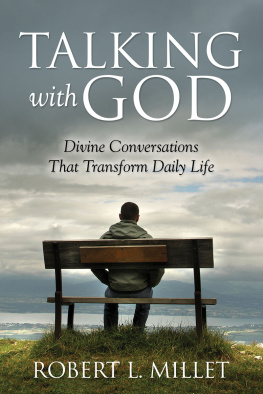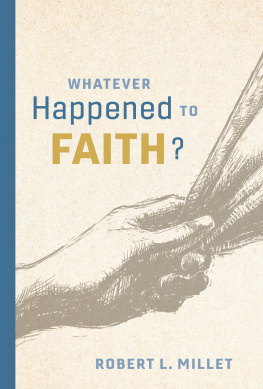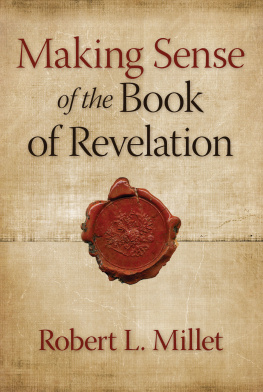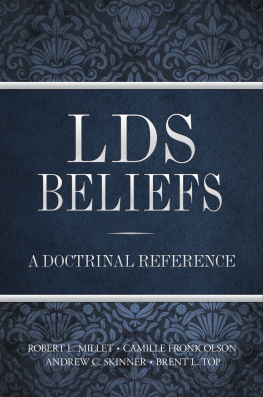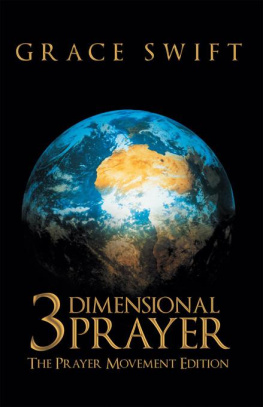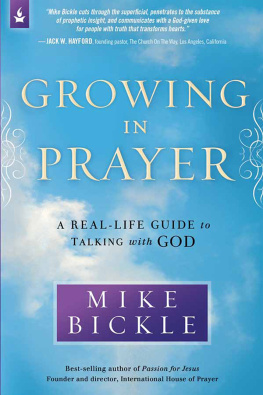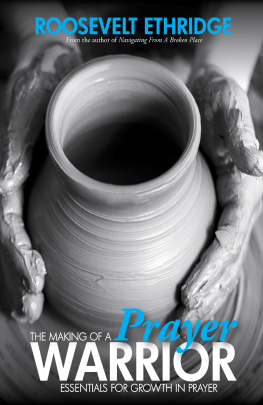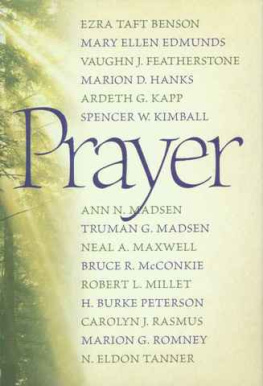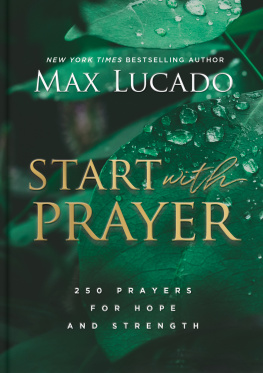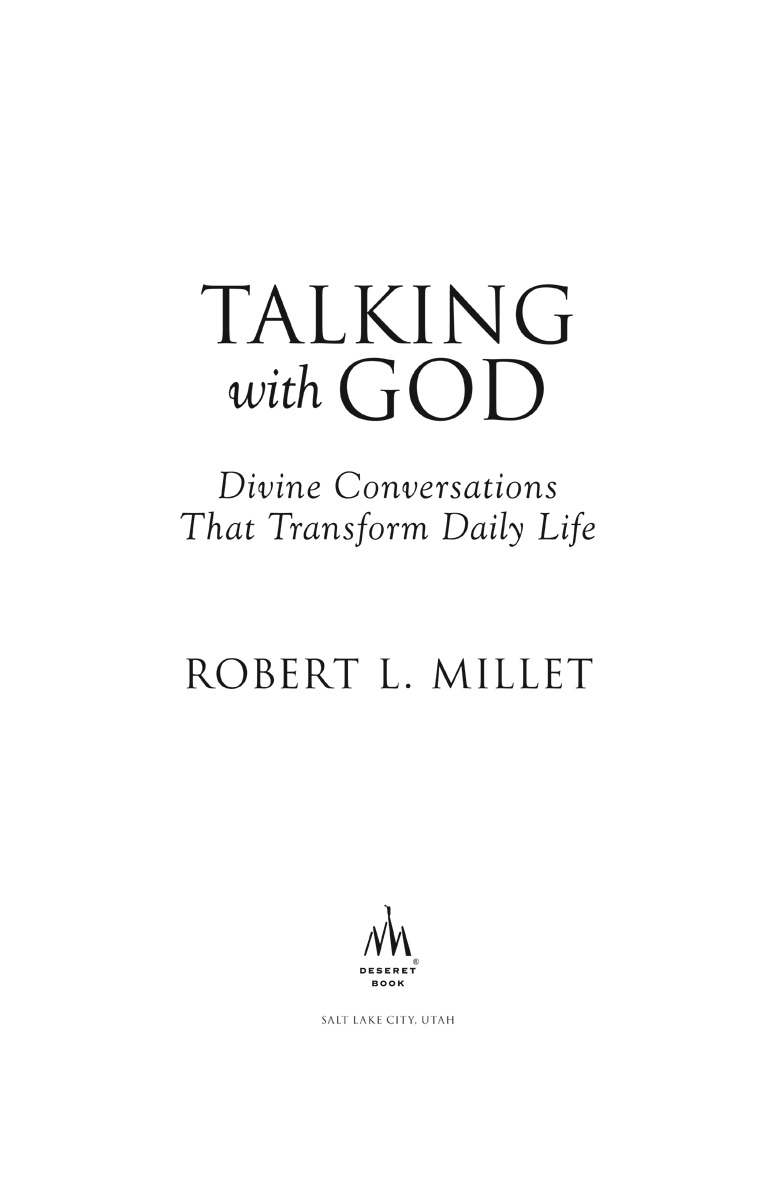2010 Robert L. Millet.
All rights reserved. No part of this book may be reproduced in any form or by any means without permission in writing from the publisher, Deseret Book Company, P.O. Box 30178, Salt Lake City Utah 30178. This work is not an official publication of The Church of Jesus Christ of Latter-day Saints. The views expressed herein are the responsibility of the author and do not necessarily represent the position of the Church or of Deseret Book. Deseret Book is a registered trademark of Deseret Book Company.
Library of Congress Cataloging-in-Publication Data
Millet, Robert L.
Talking with God : divine conversations that transform daily life / Robert L. Millet.
p. cm.
Includes bibliographical references and index.
ISBN 978-1-60641-654-9 (hardbound : alk. paper)
1. PrayerThe Church of Jesus Christ of Latter-day Saints. 2. The Church of Jesus Christ of Latter-day SaintsDoctrines. 3. Mormon ChurchDoctrines.
I. Title.
BV210.3.M55 2010
248.3'2dc22 2010001300
Printed in the United States of America
Edwards Brothers Incorporated, Ann Arbor, MI
10 9 8 7 6 5 4 3 2 1
Men and women of integrity, character, and purpose have ever recognized a power higher than themselves and have sought through prayer to be guided by such power. Such has it ever been. So shall it ever be.
President Thomas S. Monson
Introduction
Did You Think to Pray?
Not long ago I received word that my beloved Uncle Joseph in Baton Rouge had just passed away. He and his sweet wife, Gladys, who had departed this life six months earlier, were mainstays in my life of faith for more than a half century. Each time we gathered as a family in their home, I was thrilled for two reasons: first, we would be treated to Aunt Gladyss fantastic cooking; and second, after dinner we would inevitably have a gospel discussion, one in which both children and adults participated. Through the years I posed more than my share of questions about God, Christ, miracles, the purpose of life, the spirit world, and heaven and hell. Being a serious student of scripture, Uncle Joseph was always equal to the task of answering. Further, he was one who knew about the life and teachings of his Lord and Master and, most important, he knew the Lord. And we young people sitting at his feet knew that he knew. He had the words of Christ on his lips. We trusted him, and we loved him.
For years my immediate family was not much involved in the Church. My dad was a very moral and upright man, a person whose goodness and integrity were known far and wide, a fun father and one whom I loved and respected deeply. For some reason, however, we simply were not involved for a season in spiritual things. And it was Uncle Joseph and Aunt Gladys who nudged, poked, prodded, invited, enticed, and led us back into Church activity and into a stronger relationship with God. My uncle baptized both my mother and me, and he became a family hero of sorts.
As the decades rolled by, we stayed in touch, met together for several hours whenever my wife, Shauna, and I visited Louisiana, renewed treasured associations, reminisced, and spoke often of sacred things. Uncle Joseph worked for Standard Oil Company (later Exxon) for forty years, mowed his lawn, serviced his own cars, and remained healthy and robust until shortly before he left us.
Just two weeks before he died, my cousin Linda (his daughter) and I walked into his hospital room. She had been by his side day and night for some time, but I hadnt seen him in six months. I wasnt prepared for the scene: wires and tubes in his nose and mouth and an IV in his right arm. I found myself weak in the knees and a little wobbly. My beloved hero was staring death in the face. I gave him a priesthood blessing to the effect that the Almighty would grant peace and comfort to him and his family.
And so when the phone call did come, I was not surprised, but I was still struck by the harsh reality of the occasion, the seeming finality of it all, and the poignant realization that our sweet brotherhood had been interrupted for a season by this mysterious event we call death. After I hung up the phone, I immediately fell on my knees next to the hotel bed (I was attending a conference in Chicago at the time) and poured out my soul to the one Being who could understand perfectly just what I felt. I prayed. I thanked God for my uncles significant contribution to this world, for his trust in and devotion to Deity, for his example of Christlike living. I told my Heavenly Father that I would miss my dear friend greatly and that I looked forward to the time when our family gatherings would be resumed in a day when we no longer saw through a glass darkly and no longer knew only in part (1 Corinthians 13:12). We enter this life as helpless infants, and likewise we leave it helplessly in the face of death. I ached inside. I longed to turn back the pages of time. I wanted, more than anything, to be by his side at the moment of his passing. I was helpless, naked in my lack of control over the situation, and so I did the only thing I knew to doI prayed.
I believe in God. I rejoice in the privilege it is to talk of Christ, to converse reverently on his name and nature, to speak boldly of his mission and ministry, to declare with conviction his immortality and infinity. In short, there are few things I delight more in doing than speaking of the Most High. There is, however, one thing I do enjoy more, and that is speaking to him. We call that communication prayer. Regular and consistent and sincere and dedicated prayer is a sacred activity, one that transforms us into persons of purpose and of power, wholly surrendered to the mind and will of God and holy in our separation from the distractions of this world. President Thomas S. Monson has taught: Men and women of integrity, character, and purpose have ever recognized a power higher than themselves and have sought through prayer to be guided by such power. Such has it ever been. So shall it ever be.
Surely more miracles would be wrought if more of us took the time and exerted the energy to petition our God in behalf of a darkened world that is traveling headlong toward spiritual dissolution. As theologian John Stott suggested, I sometimes wonder if the comparatively slow progress towards world peace, world equity and world evangelization is not due, more than anything else, to the prayerlessness of the people of God.
We pray because we read that some of the greatest men and women in history turned heavenward when they needed clarity and conviction. We pray because the Lord and his prophets and apostles counsel us, in the strongest of terms, to request wisdom from God (James 1:56), to ask, to seek, to knock (Matthew 7:7), to persist and importune (Luke 11:58). We pray because we so often find ourselves up against the wall, uncertain and unsure where or to whom we should turn, confident that no human being has the answers to our personal struggles. It is not unimportant that the English word prayer comes from the Latin root precariusyes, a cousin to our word precarious. We pray out of desperation; we dont know where else to turn. We pray because a blessing has come into our lives, a heavenly gift that we definitely know did not come from friends, neighbors, and acquaintances; we feel driven to offer gratitude to an omniscient, omnipotent, and omniloving Father. We pray, not to change Gods mind but rather to learn the will of God and then to align our own wills with his.

